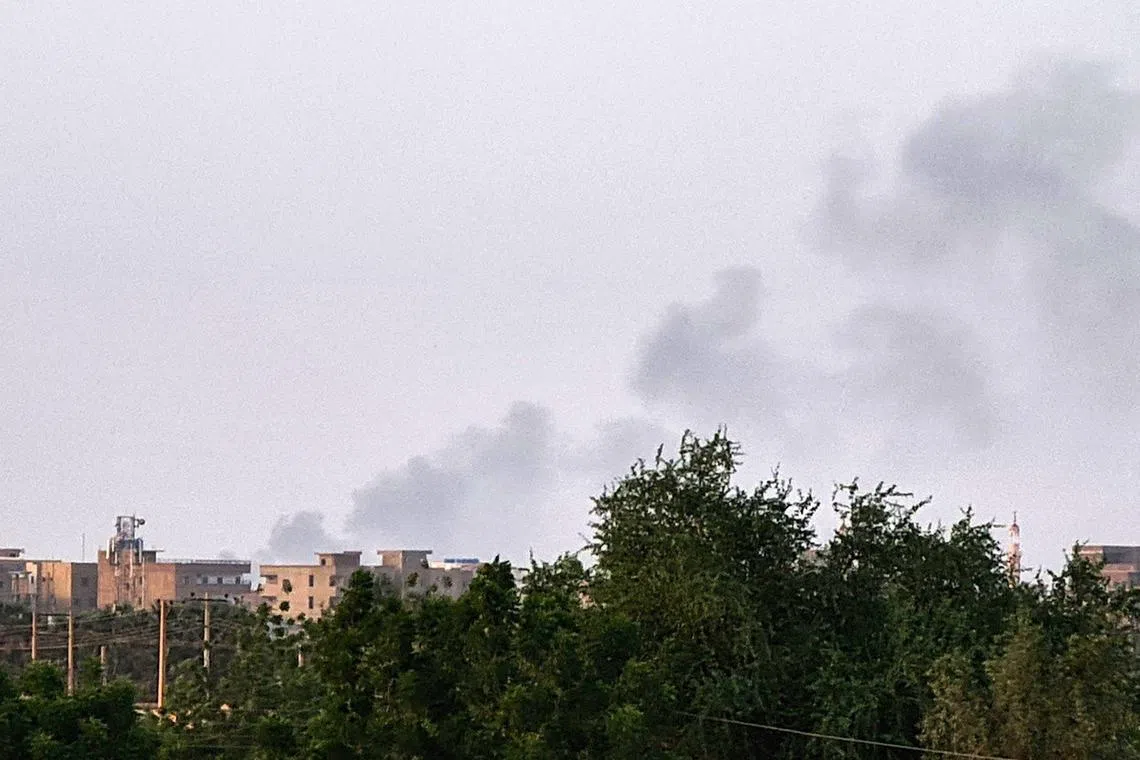Sudan’s army and paramilitary RSF agree on seven-day ceasefire
Sign up now: Get ST's newsletters delivered to your inbox

Smoke billowing above buildings in Khartoum on May 20 as violence between Sudan’s army and the paramilitary Rapid Support Forces continues.
PHOTO: AFP
CAIRO/DUBAI – Sudan’s warring factions signed an agreement late on Saturday for a seven-day ceasefire as fighting that has plunged the country into chaos entered its sixth week.
The ceasefire will take effect at 9.45pm Khartoum time on Monday, the sponsors of the talks, the United States and Saudi Arabia, said.
Numerous previous ceasefire agreements were violated.
The agreement also calls for distributing humanitarian assistance, restoring essential services and withdrawing forces from hospitals and essential public facilities.
“It is past time to silence the guns and allow unhindered humanitarian access. I implore both sides to uphold this agreement – the eyes of the world are watching,” said US Secretary of State Antony Blinken.
The fighting between Sudan’s army and the paramilitary Rapid Support Forces (RSF) has led to a collapse of order.
Stocks of food, cash and essentials are rapidly dwindling, and mass looting has hit banks, embassies, aid warehouses and even churches.
Aid groups have said they are unable to provide sufficient assistance in Khartoum, the capital, in the absence of safe passage and security guarantees for staff.
Just hours after rival generals agreed to the ceasefire, residents of Khartoum again awoke to heavy clashes on Sunday morning.
“They have announced truces that they have not held to before,” said Mr Hussein Mohammed, who remains in Khartoum North, sheltering in place with his sick mother even as their neighbourhood became deserted.
“We hope that this time, mediators can monitor that the ceasefire is implemented,” he told Agence France-Presse, adding that his mother has been unable to make her regular doctor’s appointments since before the conflict erupted.
The conflict, which began on April 15, has displaced almost 1.1 million people internally and into neighbouring countries. Some 705 people have been killed and at least 5,287 injured, according to the World Health Organisation.
In recent days, ground fighting has flared once again in the Darfur region, in the cities of Nyala and Zalenjei.
“We do not trust the warring sides,” said Mr Adam Issa, a shop owner in El-Geneina, West Darfur. “Every time, they announce a truce, and they go back to fighting. We want a permanent ceasefire, not a temporary truce.”
The army and RSF blamed each other late on Friday for sparking the fighting in Nyala, one of the country’s largest cities, which had for weeks been relatively calm due to a locally brokered truce.
A local activist told Reuters there were sporadic gun clashes near the city’s main market, close to the army headquarters, on Saturday morning. Almost 30 people have died in the two previous days of fighting, according to activists.
The war broke out in Khartoum after disputes over plans for the RSF to be integrated into the army under an internationally backed deal to shift Sudan towards democracy following decades of conflict-ridden autocracy. REUTERS, AFP


